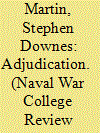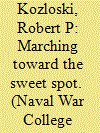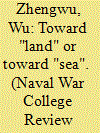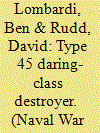|
|
|
Sort Order |
|
|
|
Items / Page
|
|
|
|
|
|
|
| Srl | Item |
| 1 |
ID:
133382


|
|
|
|
|
| Publication |
2014.
|
| Summary/Abstract |
Commonly used war-game adjudication methods break down and create unreliable results when addressing novel operational or strategic problems for which we have little experience or data (for example, information warfare or a regional nuclear conflict) and when we wish to explore situations rather than educate officers about well-understood situations. The primary causes of this breakdown are, first, the incorrect assumption that adjudicators are impartial controllers instead of dominant players and, second, the design choice to make the players' decisions the game's primary output. Among the many reasons for war gaming (such as research and analysis, training, education, and discovery), this article focuses on "discovery" war games, where the objective is to find out something previously unknown about a novel operational or strategic problem, something that cannot be better discovered by other methods, such as seminars, work groups, modeling and simulation, or operations research.
|
|
|
|
|
|
|
|
|
|
|
|
|
|
|
|
| 2 |
ID:
133383


|
|
|
|
|
| Publication |
2014.
|
| Summary/Abstract |
A case study is presented concerning the May 2010 Israeli Defense Forces (IDF) boarding of a flotilla of ships attempting to breach a blockade in the Mediterranean Sea. It particularly focuses upon clashes between the IDF and the human rights activist passengers and crew of the largest ship in the flotilla, known as the "Mavi Marmara." The article discusses blockade law, the concepts of international armed conflict (IAC) and non-international armed conflict (NIAC), and whether Israel and the Islamic organization Hamas engaged in a NIAC.
|
|
|
|
|
|
|
|
|
|
|
|
|
|
|
|
| 3 |
ID:
133379


|
|
|
|
|
| Publication |
2013.
|
| Summary/Abstract |
Before leaving his position as Secretary of Defense in 2010, Robert Gates offered a wake-up call in a speech to the Marine Corps Association in 2010: "It [is] time to redefine the purpose and size of the Marine Corps." The perception even then was that the Marine Corps had become too big, too heavy, and too far removed from its maritime roots.1
|
|
|
|
|
|
|
|
|
|
|
|
|
|
|
|
| 4 |
ID:
133385


|
|
|
|
|
| Publication |
2013.
|
| Summary/Abstract |
Since the revelation of the Ultra secret in 1974, it has been widely accepted that Ultra intelligence-that is, high-grade Axis codes decrypted by a centralized British interservice unit called the Government Code and Cypher School (GC and CS) at Bletchley Park-gave Great Britain a decisive advantage over its Axis foes and that this advantage was particularly significant in the battle against shipping to North Africa. As early as 1977, Harold C. Deutsch, a historian and head of research for the OSS (or Office of Strategic Services, the World War II forerunner of the U.S. Central Intelligence Agency), concluded that the "systematic strangulation of [Rommel's] services of supply" due to knowledge of Axis schedules and convoy routes was a "decisive ingredient of British . . . victory in the Mediterranean." Deutsch's conclusions, reached thirty-six years ago, have been affirmed in official and popular histories and remain essentially unchallenged today.
|
|
|
|
|
|
|
|
|
|
|
|
|
|
|
|
| 5 |
ID:
133380


|
|
|
|
|
| Publication |
2013.
|
| Summary/Abstract |
As North Atlantic Treaty Organization heads of state and government gathered in Chicago for the 2012 NATO summit, the alliance was once again faced with an abundance of issues and challenges. Initially forecasted as a brief, in-progress review of the decisions taken at the 2010 Lisbon, Portugal, gathering, the Chicago summit quickly emerged as an important crossroads moment for the sixty-three-year-old alliance. The future of the alliance's forces in Afghanistan, continued support to Libya, cyberdefense, and missile defense were but a few of the pressing issues that found their way into an ambitious agenda and the summit's final declaration. Nevertheless, it was the formal unveiling of the alliance's collective response to years of declining defense budgets and accelerating defense austerity that would quietly take center stage. …
|
|
|
|
|
|
|
|
|
|
|
|
|
|
|
|
| 6 |
ID:
133386


|
|
|
|
|
| Publication |
2014.
|
| Summary/Abstract |
The author discusses his thoughts concerning his experiences as the first U.S. Army officer to hold the position of executive director/deputy commander of the U.S. National Naval Medical Center (NNMC). He compares and contrasts the culture of the U.S. Army and the U.S. Navy, particularly concerning operations on land and sea, the cooperation between U.S. Navy and U.S. Army staffs during the merger of national capital health-care, and deployments of U.S. military personnel from different military branches.
|
|
|
|
|
|
|
|
|
|
|
|
|
|
|
|
| 7 |
ID:
133381


|
|
|
|
|
| Publication |
2013.
|
| Summary/Abstract |
China's maritime development having come up against pressures and challenges in recent years, the concept of "strategic hedging"-that is, pursuit of and investment in policies meant to protect the nation against the effects of geopolitical and economic uncertainty-has emerged. One of its most important proponents is Gao Bai, an ethnic Chinese professor of sociology at Duke University (in Durham, North Carolina) and the author of the article "The High-Speed Railway and China's Grand Strategy in the 21st Century" ....1 Professor Gao believes that the 2008 global financial crisis and the return, through its own strategic adjustment, of the United States to the Asia-Pacific region mean that China's "blue-water strategy" has come to an end.
|
|
|
|
|
|
|
|
|
|
|
|
|
|
|
|
| 8 |
ID:
133384


|
|
|
|
|
| Publication |
2014.
|
| Summary/Abstract |
In 1998, the British government led by Prime Minister Tony Blair released the Strategic Defence Review (SDR), in which it identified a requirement for twelve state-of-the-art warships for the Royal Navy (RN) to be configured for antiair warfare.1 This new naval platform was conceived as a replacement for the Type 42 destroyers, which had first entered service in 1978; its development was initially associated with the Anglo-French-Italian Horizon project that had replaced the NATO Frigate Replacement, from which Britain withdrew in 1989. That vision, however, had a very short shelf life. Some months after the SDR's release, Britain withdrew from the Horizon project and launched an indigenous Type 45 destroyer program.
|
|
|
|
|
|
|
|
|
|
|
|
|
|
|
|
|
|
|
|
|